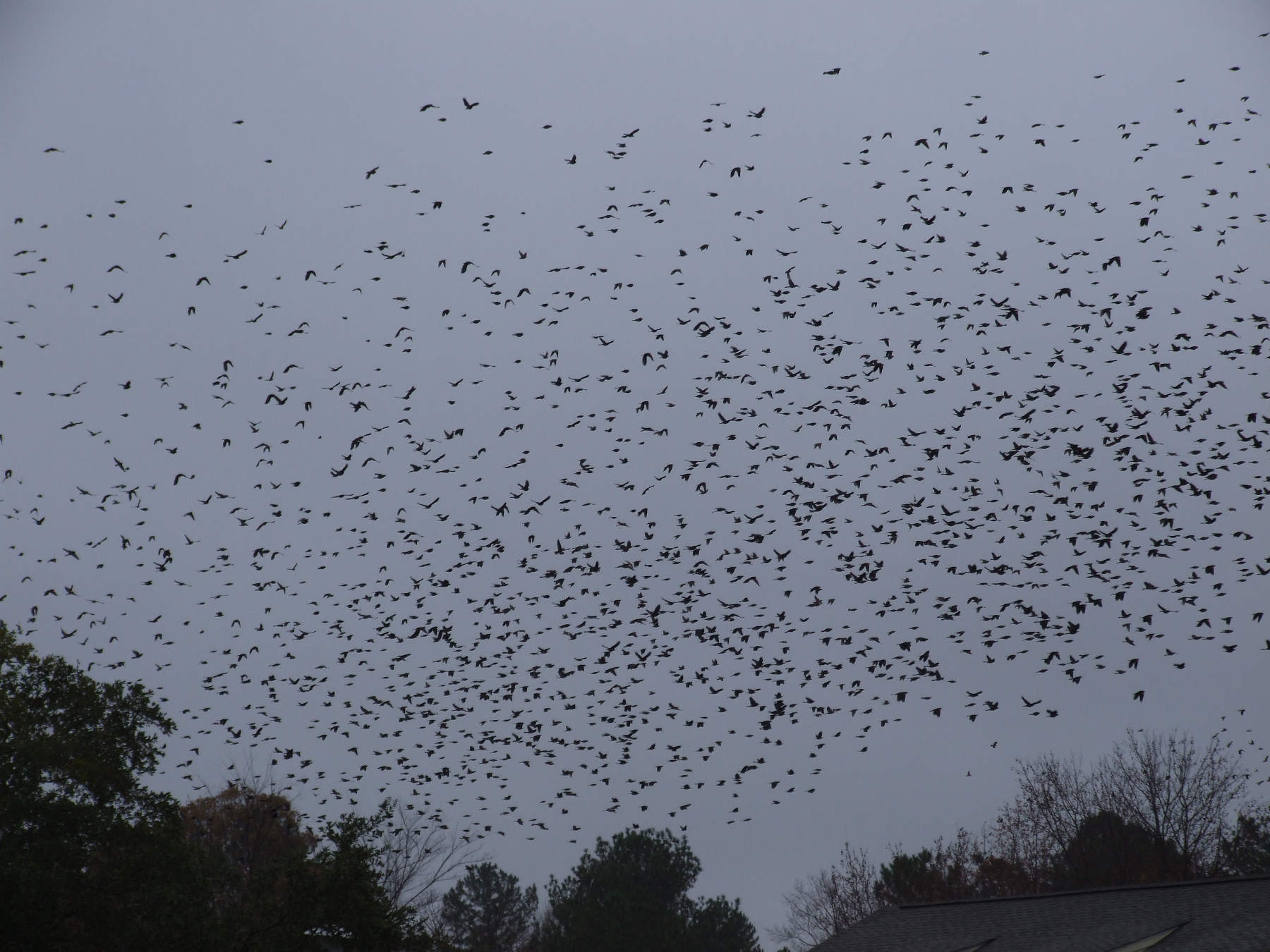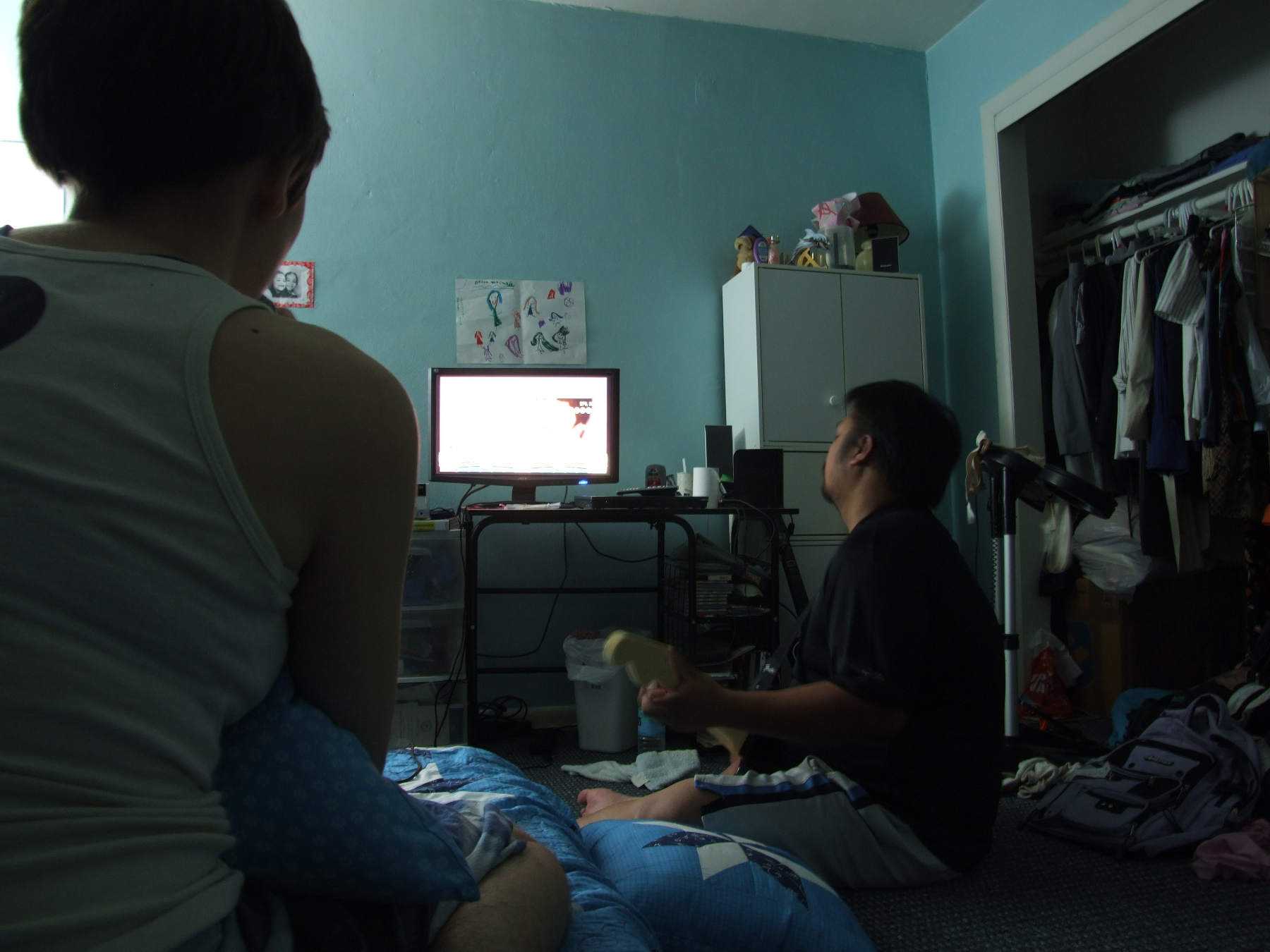05-XII-2009.

The endemic flock of starlings. Count them.
Right after midnight, chat with George, about his/our wiki. „Save issues? Okay, I'm putting it in file mode.“. „Okay, works now. As far as I'm concerned, our wiki is low traffic - can stay in file mode forever.“. The file mode means that the dll hosted by the web server passes the incoming requests in tiny files, then the fox app written in Rick Strahl's WWWC, guarding that directory, reads them and returns the requested pages. The other mode is COM, where a COM server receives the requests directly, and that's more powerful, but it craps out sometimes, which I witnessed many times.
Me (unrelated): I've gone through the SHET Fogbugz, and now I see I didn't assign each properly. Don't get alarmed, they're all either mine to fix, or Laura's to check after next build, or Laura's to close (I couldn't close them myself as I didn't create them).
Das found an article about the mythical 1.0, „Version 1 Sucks, But Ship It Anyway“. The part that Jan liked:
The velocity and responsiveness of your team to user feedback will set the tone for your software, far more than any single release ever could. That's what you need to get good at. Not the platonic ideal of shipping mythical, perfect software, but being responsive to your users, to your customers, and demonstrating that through the act of continually improving and refining your software based on their feedback. So to the extent that you're optimizing for near-perfect software releases, you're optimizing for the wrong thing.
Das: „My fav was "if you aren't embarrassed by v1.0 you didn't release it early enough" :)“.

Called the dealer... of course, he hasn't sent my driver's license. He'll send it on monday. I'm still driving the old Corolla. I must be the epitome of patience, to have a new car and not drive it for a week. Drove to Walmart in the evening, to buy some butt paper and maple syrup. Almost freezing, some global warming indeed. Drives nice and silent.
Lena, Nina and Ender play the Rock Band with real toy guitars, well, guitar-shaped controllers, and Lena is even singing.
A rare and lengthy piece I wrote on UT, about an article which describes the situation at home from a different angle.
>Interesting. So inside the same country of Serbia, the Albanians:
>
>have their own TV, radio programs and channels in Albanian, their own newspapers in Albanian language, tuition-fee free primary, secondary schools and even university in Albanian language with textbooks imported from Albania, free dental and medical care, abundant welfare,
This is about the state of affairs before Sloba. As for medical care etc, everybody had that, and so did they. But for the rest, they had the whole university, with just the library being a huge building, with those skullcap domes, paid by all of us - and what were they learning there? The details of their 150 year old plan to retake as much of the area for the next Ottoman empire. In their textbooks, they usually had the borders wrong, with Albania taking whole Kosovo and Metohija, west Macedonia, some pieces of Serbia proper, Greece and Montenegro. Their kids knew little about Yugoslavia, usually answered that Tirana was their capital etc etc. They were indoctrinating their next generation for the plan, with our money. We had a permanent fund for the development of underdeveloped parts of the country. Several factories from the developed regions were just dismantled and rebuilt there, in the late forties.
Under the guise of "equality for nationalities" ("minority" was not PC to say) they introduced bilinguality as a requirement for governmental employment, which meant that only a few Serbs could get a job, and their bosses were Albanians. Albanians spoke both languages when it suited them, but if you just stopped to ask a couple of them for directions, they would speak only Albanian. If you met one and nobody saw you, he would. When I was in the Army, I had several Albanian pals, and it happened dozens of times that we'd talk about anything, and the conversation would stop when another Albanian approached. They were watching over each other, lest some may take the official policy of "brotherhood and unity" too seriously.
The bit that changed with Sloba was that he rose to power promising protection to Serbs in Kosovo and Metohija, and when he got the power, he reunited Serbia his way, revoking a lot of autonomy the two provinces had, putting (those) Serbs (who were loyal to him) into power, but that didn't stop the Albanians - by that time, they had a parallel government of their own. Though they still went to Serbian doctors, knowing that their university was more of a factory for political cadre than for experts.
This is about those in power, though. I have read a lot of first-hand accounts of how neighbors saved neighbors, specially during the bombing, regardless of nation, and also how decade old trust in some other neighbor was betrayed.
I've heard several explanations as to why did the West go with the Prizren League plan - Rio Tinto wanted to own the lead and zinc (and some silver) mines in Trepča, Halliburton needed a place to build an expensive military base and make good money; Vatican et al wanted the Orthodox and the Muslim pitted against each other so to further their long term goals of expansion; the US wanted to show the Muslim world that they aren't against the Islam in general by helping these guys (no matter that the FBI still had KLA listed as a terrorist organization, and that the pan-islamic assortment of mujahedeen already gathered in Bosnia and then moved to K&M - Osama had a Bosnian passport); making Albania a strong ally of NATO would balance Greece between it and Turkey... lots of possible explanations, but then few of them plausible enough, until the archives open.
and the Serbs do not? The article is confusing as to which country it is referring to: Serbia, Albania, Croatia, Slovenia, Montenegro and Hungary? Or is the issue mostly of Serbs in Albania and other countries?
It is confusing a bit, because it wanted to point out the double standards, so on one side it elaborates how Albanians in SFRY and, for the most part, in FRY had rights far above European standards (find another country in the 70s to 90s with government-funded TV and radio, full scale education system and all official acts in the minority language, all run by the minority itself), and then it isn't quite obvious when it shifts to the other side, how did Serbs fare in places where they are a minority, which is usually bad - Ceauşescu has forcedly moved Serbs into the near-desert of Baragan, Enver Hoxha had the strict "Albania is Albanians" policy... pretty much like Stalin, the Georgian, was a great Russian. Hungary is so-so, I drove through Sent Andreja/Szentendre, and sure there are Cyrillic captions in many places, but it's a place they show. Since recently, there's a Serbian grammar school in Budapest etc, so it's getting good. There's a huge Slovakian minority in Hungary, and then there's a lot of Hungarians in surrounding countries. Mind you, the overturn in Romania started with a Hungarian priest.
>If so, then there should be more public media attention to that. Also, Nato is not only the U.S. and some of those issues are handled by the U.N. not Nato. According to the article, Albanians were given protection and rights, but no guarantee of the same has been for Serbs? Do the Serbs have those same rights (other than the issue of the surname in Albania) but are not guaranteed?
From what I read, there's no guarantee, not even enforcement. The NATO forces are mostly trying to not get involved, so the ethnic cleansings of non-Albanians from K&M never really stopped. BTW, back home my first neighbor is a Gypsy, refugee from there. His brother's family is down the street.
It would be interesting to read the transcripts from the Nato and UN sessions.
Indeed. And the eye-to-eye coaching before those sessions.
Mentions: Ender Aquila (Ender), fox, George Whiteley, Jan Brenkelen, Jelena Sredljević (Lena), Laura O'Hare, Mohandas Raj (Das), Nevena Sredljević (Nina), SHET, in serbian